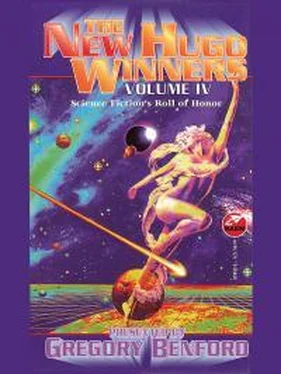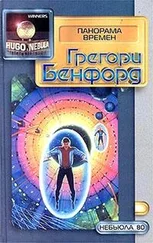Грегори Бенфорд - The New Hugo Winners - Volume IV
Здесь есть возможность читать онлайн «Грегори Бенфорд - The New Hugo Winners - Volume IV» весь текст электронной книги совершенно бесплатно (целиком полную версию без сокращений). В некоторых случаях можно слушать аудио, скачать через торрент в формате fb2 и присутствует краткое содержание. Год выпуска: 1997, ISBN: 1997, Издательство: Baen, Жанр: Фантастика и фэнтези, на английском языке. Описание произведения, (предисловие) а так же отзывы посетителей доступны на портале библиотеки ЛибКат.
- Название:The New Hugo Winners - Volume IV
- Автор:
- Издательство:Baen
- Жанр:
- Год:1997
- ISBN:0-671-87852-2
- Рейтинг книги:5 / 5. Голосов: 1
-
Избранное:Добавить в избранное
- Отзывы:
-
Ваша оценка:
- 100
- 1
- 2
- 3
- 4
- 5
The New Hugo Winners - Volume IV: краткое содержание, описание и аннотация
Предлагаем к чтению аннотацию, описание, краткое содержание или предисловие (зависит от того, что написал сам автор книги «The New Hugo Winners - Volume IV»). Если вы не нашли необходимую информацию о книге — напишите в комментариях, мы постараемся отыскать её.
The New Hugo Winners - Volume IV — читать онлайн бесплатно полную книгу (весь текст) целиком
Ниже представлен текст книги, разбитый по страницам. Система сохранения места последней прочитанной страницы, позволяет с удобством читать онлайн бесплатно книгу «The New Hugo Winners - Volume IV», без необходимости каждый раз заново искать на чём Вы остановились. Поставьте закладку, и сможете в любой момент перейти на страницу, на которой закончили чтение.
Интервал:
Закладка:
Only the mountaintops were in the light. She aimed for the nearest and tallest mountain she could see and made her way across the darkness to it, stumbling and crawling in the ocean of ink, at last pulling herself into the light like a swimmer gasping for air. She huddled on her rocky island, desperate as the tide of darkness slowly rose about her. Where were they? Where were they?
Back on Earth, work on the rescue mission had moved at a frantic pace. Everything was checked and triple-checked in space, cutting corners was an invitation for sudden death, but still the rescue mission had been dogged by small problems and minor delays, delays that would have been routine for an ordinary mission, but loomed huge against the tight mission deadline.
The scheduling was almost impossibly tight—the mission had been set to launch in four months, not four weeks. Technicians scheduled for vacations volunteered to work overtime, while suppliers who normally took weeks to deliver parts delivered overnight. Final integration for the replacement for Moonshadow, originally to be called Explorer but now hastily re-christened Rescuer, was speeded up, and the transfer vehicle launched to the Space Station months ahead of the original schedule, less than two weeks after the Moonshadow crash. Two shuttle-loads of propellant swiftly followed, and the transfer vehicle was mated to its aeroshell and tested. While the rescue crew practiced possible scenarios on the simulator, the lander, with engines inspected and replaced, was hastily modified to accept a third person on ascent, tested, and then launched to rendezvous with Rescuer. Four weeks after the crash the stack was fueled and ready, the crew briefed, and the trajectory calculated. The crew shuttle launched through heavy fog to join their Rescuer in orbit.
Thirty days after the unexpected signal from the moon had revealed a survivor of the Moonshadow expedition, Rescuer left orbit for the moon.
From the top of the mountain ridge west of the crash site, Commander Stanley passed his searchlight over the wreckage one more time and shook his head in awe. "An amazing job of piloting," he said. "Looks like she used the TEI motor for braking, and then set it down on the RCS verniers."
"Incredible," Tanya Nakora murmured. "Too bad it couldn't save her."
The record of Patricia Mulligan's travels was written in the soil around the wreck. After the rescue team had searched the wreckage, they found the single line of footsteps that led due west, crossed the ridge, and disappeared over the horizon. Stanley put down the binoculars. There was no sign of returning footprints. "Looks like she wanted to see the moon before her air ran out," he said. Inside his helmet he shook his head slowly. "Wonder how far she got?"
"Could she be alive somehow?" asked Nakora. "She was a pretty ingenious kid."
"Not ingenious enough to breathe vacuum. Don't fool yourself—this rescue mission was a political toy from the start. We never had a chance of finding anybody up here still alive."
"Still, we had to try, didn't we?"
Stanley shook his head and tapped his helmet. "Hold on a sec, my damn radio's acting up. I'm picking up some kind of feedback—almost sounds like a voice."
"I hear it too, Commander. But it doesn't make any sense."
The voice was faint in the radio. "Don't turn off the lights. Please, please, don't turn off your light. . . ."
Stanley turned to Nakora. "Do you . . . ?"
"I hear it, Commander . . . but I don't believe it."
Stanley picked up the searchlight and began sweeping the horizon. "Hello? Rescuer calling Astronaut Patricia Mulligan. Where the hell are you?"
The spacesuit had once been pristine white. It was now dirty grey with moondust, only the ragged and bent solar array on the back carefully polished free of debris. The figure in it was nearly as ragged.
After a meal and a wash, she was coherent and ready to explain.
"It was the mountaintop. I climbed the mountaintop to stay in the sunlight, and I just barely got high enough to hear your radios."
Nakora nodded. "That much we figured out. But the rest—the last month—you really walked all the way around the moon? Eleven thousand kilometers?"
Trish nodded. "It was all I could think of. I figured, about the distance from New York to LA and back—people have walked that and lived. It came to a walking speed of just under ten miles an hour. Farside was the hard part—turned out to be much rougher than nearside. But strange and weirdly beautiful, in places. You wouldn't believe the things I saw."
She shook her head, and laughed quietly. "I don't believe some of the things I saw. The immensity of it—we've barely scratched the surface. I'll be coming back, Commander. I promise you."
"I'm sure you will," said Commander Stanley. "I'm sure you will."
As the ship lifted off the moon, Trish looked out for a last view of the surface. For a moment she thought she saw a lonely figure standing on the surface, waving her goodbye. She didn't wave back.
She looked again, and there was nothing out there but magnificent desolation.
Gold
by Isaac Asimov
Isaac Asimov introduced earlier collections of Hugo winners with his jovial authority. This story carries forward effortlessly, gliding on his unique gift for quick narration and darting ideas. Isaac was a genius at the apparently simple. Anyone who thinks that writing about complex ideas, including both modern science and the human heart, with clarity and simplicity, is welcome to try; if so, take Asimov as your model. Like Arthur Clarke, his method is deceptively transparent; indeed, readers typically remark of them both, as I heard a fan put it, "They have no style, they just write."
Ah, the depths of admirable innocence behind that phrase. For it is best if a reader does not see the furniture moving around behind a thin curtain, while reading a story. The events of the imagined world should be real, manufactured by the reader himself in that theatre of the mind which words excite. Reading is an intellectually demanding amusement, for it calls upon us to take symbols and make of them pictures, sights, sounds, to conjure up people and emotions with our mental machinery. How much more difficult to do this if the devices of the author peek into the mental field of vision, destroying the fleeting sense of real events unfolding. So it is with style, I think, for most readers. They do not want to see style so much as feel it. They desire to be propelled through events and sensations and ideas which unfurl effortlessly, as though ordained, and they do not wish to feel any intrusion. The author's voice does this task best when it is transparent, seemingly "natural," inevitable.
Isaac had that gift. Of course, what style appears invisible yet effective depends upon the taste of the reader. For a huge readership, Isaac's worked that wonder. He is the only author represented with a book in each classification of the Dewey Decimal System in the Library of Congress. Not only did he write compulsively, he did it well. I have known only two writers who truly enjoyed the sheer process of writing— from the deep concentration through the mechanical details of hammering out thoughts on a keyboard, through (in Isaac's case) the tedium of making up cards for each important word in a book, to create its Index. (The other is Dean Koontz, whose work methods are quite different, but inner demons seem similar at least in their incessant energies.)
Alas, we shall have no more of Isaac's limpid prose. I was so struck by his death that when his widow, Janet, proposed to me in 1995 that I write a novel set in his Foundation, I at first declined. My first thought was, how could I echo that style? Isaac wrote much of his fiction in a way he termed "direct and spare," though in the later works he relaxed this constraint a bit. For the Foundation novels he used a particularly bare-boards approach, with virtually no background descriptions or novelistic details. I found that I had to explore Asimovian ideas my own way, so the resulting book, Foundation's Fear, is not an imitation Asimov novel, but a Benford novel using Asimov's basic ideas and backdrop.
Читать дальшеИнтервал:
Закладка:
Похожие книги на «The New Hugo Winners - Volume IV»
Представляем Вашему вниманию похожие книги на «The New Hugo Winners - Volume IV» списком для выбора. Мы отобрали схожую по названию и смыслу литературу в надежде предоставить читателям больше вариантов отыскать новые, интересные, ещё непрочитанные произведения.
Обсуждение, отзывы о книге «The New Hugo Winners - Volume IV» и просто собственные мнения читателей. Оставьте ваши комментарии, напишите, что Вы думаете о произведении, его смысле или главных героях. Укажите что конкретно понравилось, а что нет, и почему Вы так считаете.








